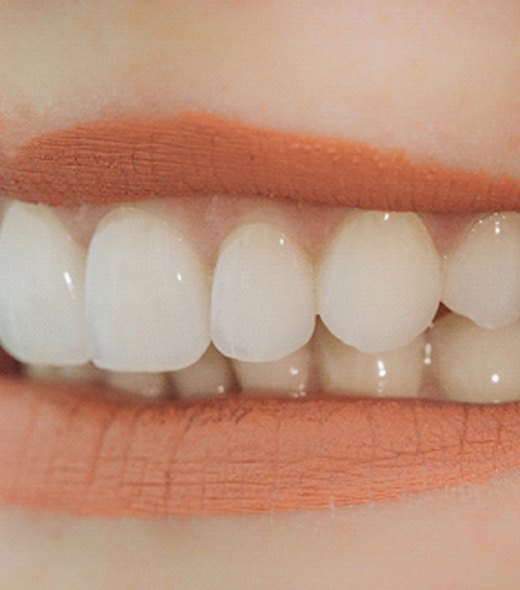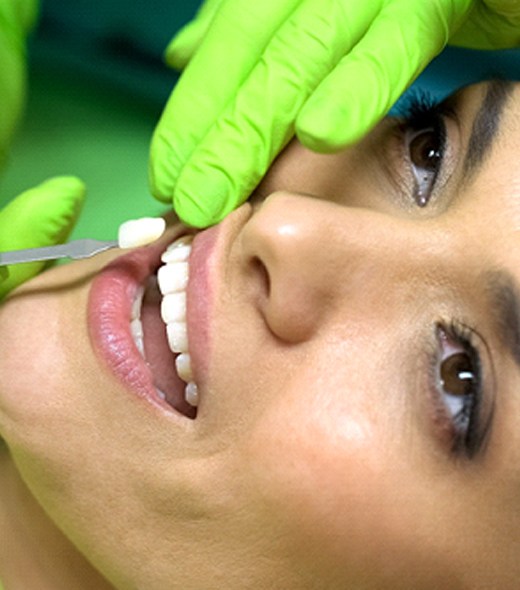Veneers – Lubbock, TX
Perfect Your Smile with Veneers

Not everyone is born with the perfect smile that they have always dreamed of. Fortunately, thanks to modern dental technology, you don’t need to settle for teeth that you aren’t confident showing off. Dr. Kevin Shively offers dental veneers to give patients that perfect, red carpet-ready smile they are looking for. Customized veneers in Lubbock can help to drastically improve the appearance of your teeth. To learn more or to schedule a consultation, give us a call and we’d be happy to help!
Why Choose Kevin Shively, DMD for Veneers?
- Dentist Committed to Continuing Education
- Made from High-Quality Porcelain
- Dental Membership Plan Available
What are Dental Veneers?

Dental veneers are thin shells of tooth-colored material that are placed over the front surface of the teeth in order to mask imperfections. They are placed using a minimally invasive procedure and conceal a world of cosmetic flaws that many people feel self-conscious about. Many patients consider them because they have teeth that are:
- Cracked
- Chipped
- Misshapen
- Discolored
- Undersized
- Gapped
The dental porcelain and ceramic that is used to make veneers closely resembles your natural tooth enamel, leaving you with a beautiful, healthy appearance. On top of that, these materials are very strong and prevent stains and chips in the future!
The Process of Getting Veneers

First, you will have your initial consultation with Dr. Shively. During this time, you will discuss the goals you have for your smile and how veneers can help you achieve the results you’re looking for. If you are deemed to be a good candidate for the procedure, a small portion of enamel is taken of the front-facing surface of the teeth and an impression will be made. This is then sent off to a dental laboratory where your dental veneers will be made. In the meantime, we will provide you with a temporary set of veneers so you can become accustomed to how your teeth will feel with your custom ones. As soon as we receive your veneers, you can return to the practice, and they will be cemented into place. At this time, small adjustments can be made to give you a perfectly comfortable and natural smile!
The Benefits of Veneers

Dental veneers provide all sorts of different benefits for patients who are looking to say goodbye to cosmetic flaws. Here are just a handful of them:
- Stain resistance: Veneers resist stains much more than your natural tooth enamel does. They are ultimately a long-term whitening solution.
- Long life: When cared for properly, veneers can last more than 15 years!
- Look natural: Veneers are placed in a way that makes them appear natural. No one will be able to tell that you have had cosmetic dental work.
- Personalized: Dental veneers are crafted to be the exact size, shape, and color necessary to blend in with the rest of your smile.
Veneer FAQs
Is There Anything I Can’t Eat with Veneers?
After your teeth are prepared, Dr. Shively will attach temporary veneers to keep your pearly whites safe while your permanent restorations are made. During that time, you’ll need to avoid hard foods (i.e., ice, candy, raw vegetables), sticky foods (i.e., gum, caramel, toffee), and dark-colored foods and drinks (i.e., soda, red wine, tea, curry). Even though you can enjoy almost any food you want once your permanent veneers are in place, you’ll need to continue to exercise caution with certain things. Be sure to drink alcohol sparingly as it can weaken the bonding material holding your restorations in place.
Do Veneers Give You a Lisp?
Initially, you may have difficulty pronouncing certain words or making specific sounds because you’re not used to talking with veneers. While it’s a tiny difference in thickness, it still affects the way the tongue moves. The good news is that any lisp you develop is temporary and should go away with time and practice. You can speed up the adjustment process by reading aloud, having more conversations with loved ones, and repeating difficult-to-pronounce words. If needed, you can ask your dentist to slightly reduce the thickness of the veneers in a certain area to make the impediment go away.
How Are Veneers Different Than Crowns?
Veneers are ultra-thin sheaths of dental-grade porcelain that are bonded to the front-facing portions of teeth to mask any imperfection from view. Meanwhile, crowns are three-dimensional restorations that are shaped like an entire tooth. They’re primarily used to protect worn, cracked, or damaged teeth. Veneers don’t show a gum margin like crowns do after several years, plus, they require far less enamel alteration than crowns.
Is It Painful to Get Veneers?
Before your veneers are placed, your mouth will be numbed completely with a local anesthetic to ensure you feel comfortable. It’s worth noting that you may feel some sensitivity and pain after your procedure. However, it’s more common when multiple veneers are placed. For example, two to four veneers typically cause little to no pain, while eight or more can lead to soreness in the gums and the jaw. You can alleviate your discomfort by taking over-the-counter pain medications like ibuprofen.
